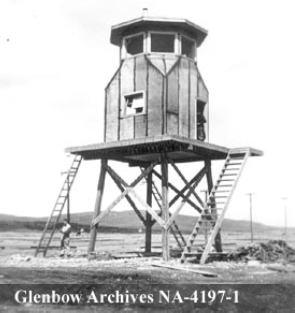
|
|
Here is part 2 in our series of recollections by Canadian Lt. Leo L. Hamson, regarding his time as a guard at the Wainwright POW camp. (Update: The full set of Recollections is back online, with photos.) I opened the series last week with his story of Klaus Conrad's escape, though this entry actually comes first. I think it must have taken place in the Winter of 1945-1946, i.e. after the war was over but before POWs were sent back to Germany. My Introduction to a World Behind Barbed WireI cannot now remember the date that I was posted to the Wainwright POW camp in Northern Alberta other than it was in the depth of winter. And I am not certain to this day that it was because they actually needed me, or because they did not know what else to do with a surplus 25-year-old artillery lieutenant recently returned from overseas who was declining to take his discharge but still had to earn his keep. On arrival at the railroad station, I was met by a private of the Veterans’ Guard Of Canada driving an open jeep and my trunk was slung in the back. As we entered the precincts of the camp in brilliant winter sunshine, I saw for the first time the great prisoner-of-war stockade consisting of two high fences about twelve feet apart. The massive posts and criss-crossed barbed wire enclosed several acres, with neat rows of barracks of the style that was standard for the Canadian Army, an equivalency for the POWs as prescribed by the Geneva Convention. At intervals along the fence were the formidable guard towers, large structures with several flights of wooden stairs to reach the top-most glassed-in deck from which the armed guards kept watch. It was a chilling sight. We passed a hockey rink set up outside the barbed wire stockade. A vigorous game was in progress. I commented to my driver, “Oh! I see you play hockey here.” “Yes sir!” he responded cheerily, “Today the guards are playing the POWs” I was too shocked to make any reply. Evidently fraternization with the enemy was alive and well in Wainwright Prisoner-of-War Camp 135. After getting installed in my room in the Officers’ Quarters, I went to the H.Q. building and reported to Major Shanks, the commandant of Veterans’ Guard of Canada No. 27 Company. While eyeing me up and down, he noted the empty holster on my belt and asked me where my revolver was. I said that after returning from overseas I saw no further need for lugging the heavy thing around and turned it in to the quartermaster in Calgary. He said, “Well, you will need one here. Go to the Q.M. Stores and draw one!” He indicated a building in the distance on a slight rise. On the road to the building, I saw three figures approaching, marching briskly. As they passed me, they saluted me smartly. I was stunned to realize they were German officers, and we were outside the stockade! I had automatically returned their salute, and then remembered the order of the vengeful General Eisenhower overseas that we were not to return the salutes of German prisoners. I had felt uncomfortable and embarrassed by this ban on what had always been considered an honourable military courtesy, even for a defeated enemy. When I entered the building, I found the usual quartermaster stores with shelves loaded with clothing, boots, equipment, tools, and weapons, all behind a long counter. At first there appeared to be no-one there, but suddenly a man at a desk behind the counter leaped to his feet and saluted me. I could hardly believe my eyes. He was dressed impeccably in the uniform of a German captain. Something was terribly wrong here. Mindful of what I had come for, I stammered, “There must be some mistake.” and turned to leave. Before I could reach the door, he called out in excellent English “You must be Lieutenant Hamson. I had a phone call from the Orderly Room about you. You have come for this.” He then reached under the counter and placed a regulation Smith and Wesson .38 caliber revolver on the counter. From a drawer he withdrew a box of cartridges, opened it to ensure that it was full and correct, and pushed the two items toward me. Then, as I stood there speechless, he pushed a book toward me. “Please sign here.” In a state of shock, I fumbled as I stowed the revolver in my holster, put the cartridges in my belt pouch, and walked unsteadily out the door. What kind of a place was this? Alice in Wonderland? A prisoner issuing me a GUN? When I went into the Orderly Room, I was in for a further shock. The people working busily at filing cabinets, typewriters and the switchboard were German officers. A Veteran’s guard lounged in a corner, smoking a pipe and reading a newspaper. When I encountered the commandant later, I let him know of my total astonishment to find the place apparently being run by the prisoners. “Of course!” he said, “The ones you see outside the stockade have signed a parole and they love having something useful to do. They are very good at it too…Teutonic efficiency and all that sort of thing, you know. And that gives us more time to spend in the mess drinking beer!” He then glanced at his watch. “My goodness! Time for four o’clock tea! Come along!” Copyright 2004 by Leo Hamson; used with permission
Add Comment
|

